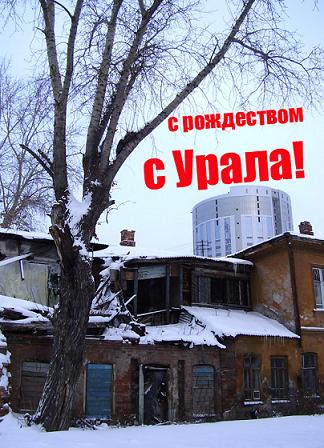«С Рождеством с Урала!» [Merry Christmas from the Urals!] Posted by josefina on Dec 24, 2008 in Culture, Traditions
«С Рождеством с Урала!» This Christmas card is old – from 2006, when I had just moved to Yekaterinburg, and there’s a mistake in it (guess where?). When I sent it out to friends and family that year it caused a sensation because of its… well, partly because of its portrait of Russian contemporary society, and its use of prepositions. One «с» but after it two different cases – how come?
As much as I today just want to wish all of you readers a wonderful, beautiful, cozy, warm, tender, loving Christmas together with family and friends, I feel that I should take a moment to explain the situation with the prepositions above. First of all, most I think are familiar with the preposition «c» in the context of «с чем, с кем?» [with what, with whom?], meaning it is followed by instrumental case. The original way of congratulating someone with some holiday of sort was «поздравляю тебя с праздником» but soon half of the sentence was shortened, and that’s why we’re in Russian language today only left with «С Рождеством Христовым!» [Merry Christmas! lit. ‘with Christ’s birth’], but everyone knows that it’s all about congratulations anyway. But «с» can also mean ‘from’, if it is paired with a noun that needs «на» to mean ‘on’. Okay, so that may not help anyone. Let’s take a look at an example instead – «назавод» is in this case accusative, meaning ‘to the factory’, and that makes «наУрал» mean ‘to the Urals’. But in a sentence like «онработаетназаводе» [he works at the factory] the same preposition needs to be followed by the locative case. The very same happens in «онаживётнаУрале» [she lives in the Urals]. But when you want to leave the factory or the Urals, you have to use «с» like you would normally use «из» [for nouns that need «в» in locative and accusative] with genitive – «онушёлдомойсзавода» [he went home from the factory] and «онауехалавМосквусУрала» [she went to Moscow from the Urals]. I hope that makes at least a little bit sense!
The mistake I made, by the way, back in 2006 was that I wrote «Рождество» with a small «р», which is as much against the rules in Russian as is saying ‘Merry christmas’ in English or ‘God jul’ in Swedish. Which makes sense, since He, our Lord, is always written with a big L or a big H.
I wish you all a wonderful holiday!
НАСТОЯЩЕГО СЧАСТЬЯ, ЗАМЕЧАТЕЛЬНЫХ УСПЕХОВ, КРЕПКОГО ЗДОРОВЬЯ, СИЛЬНОЙ ЛЮБВИ И ВЕЧНОЙ ДРУЖБЫ ВАМ!
[I WISH YOU REAL HAPPINESS, WONDERFUL SUCCESSES, STURDY HEALTH, STRONG LOVE AND ETERNAL FRIENDSHIP!]

Build vocabulary, practice pronunciation, and more with Transparent Language Online. Available anytime, anywhere, on any device.





Comments:
Harold Wheeler:
Dear Friend,
Have a very special Christmas and Happy prosperous New Year!
I look forward to you Blog and struggle through it every time it comes. The struggle is purely on my part as I am a novice American trying to learn something about the Russian language and culture.
I am 75 years old and hope to learn enough to read some Good Russian literature. I have read War and Peace and Crime and Punishmnet this year (In English I am sad to say). My struggle is with pronunciation I listen to tapes but the nuances escape my failing ears. I want to find a place where the transliteration is a part of the words for the day. I think I can do better with a little help.
Your blog is a wonderful thing. I appreciate the time and effort you put in this work. You must be a very good student of the Russian Language.
Thank you for keeping me looking at a bit of the language every day.
Harold in Oklahoma, USA
hani elbedawy:
thank you
Jayne:
Hope you had a lovely Christmas!
Have just discovered family in Chelyabinsk in Siberia 🙂
Don Schafer:
Hi, I am a regular reader of your blog – Thanks so much for all the thoughtful work and time that you put into it! I really enjoy it! Russian has been a hobby of mine since I took 2 years back in grad school in the mid 80s.
I had a question: Was your gift a four volume set comprising an Etymological Russian dictionary? If so, how fascinating! Where could one get this here in the USA? Or just find in a library? I would love to peruse such a work!
Bsevo shoroshovo!
Don Schafer
Walla Walla Washington